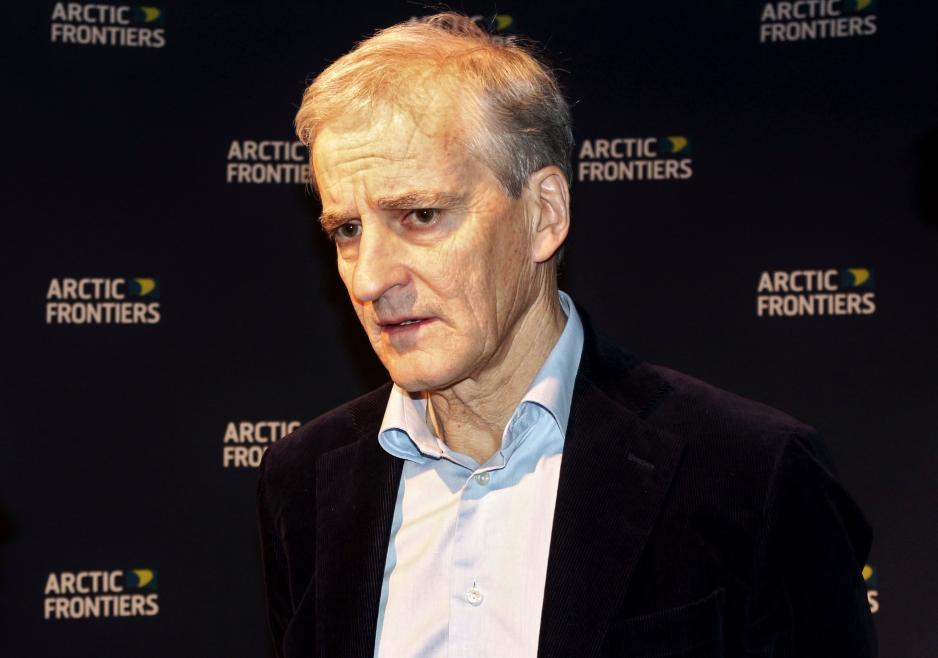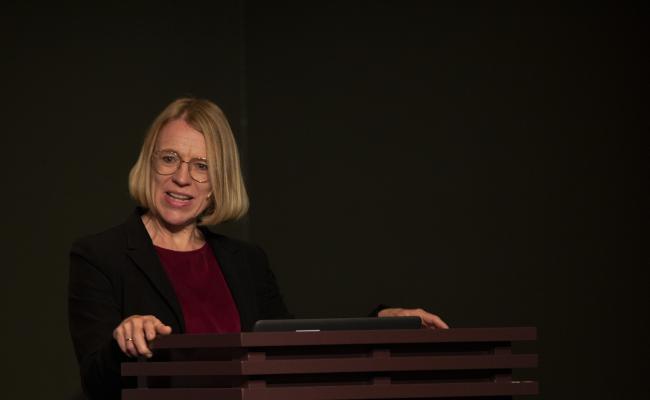Norwegian PM Støre: We Should Be Able to Find Solutions With Russia

Norwegian Prime Minister Jonas Gahr Støre (Labor) at the Arctic Frontiers 2023 conference. (Photo: Trine Jonassen)
Tromsø, Northern Norway: Norway is used to dealing with Russia and finding solutions to important issues, says the Norwegian PM. A strong trust in the Norwegian Russia competence was common among several researchers, politicians, and officials that attended the Arctic Frontiers conference.
"Cold security policy winds in the High North have their origin somewhere else but will have consequences here. We will take responsibility for continuing the work for low tension in the High North. We should be able to find solutions with Russia on some issues that come as a result of our neighborship, among other things. This is a responsibility that Norway is used to and will take – also in a heightened security policy situation," says Norwegian Prime Minister Jonas Gahr Støre (Labor) to High North News at the Arctic Frontiers conference in Tromsø, Northern Norway.
Back in Oslo, Støre elaborates on this in a statement to the Norwegian Parliament, the Storting:
"The relationship with Russia cannot be the same before Russia takes responsibility for its actions. But this remains the same: We do not choose our geography. We must deal with Russia, now and in the future as we have in the past. We will continue to do ours to contribute to orderly conditions," says the PM and continues:
"We will contribute to low tension at the border, at sea, and on land. We will treat the Russian people with the respect that all people deserve. We will point our criticism towards the Russian regime. We want contact and practical cooperation on issues regarding the border, sea rescue, and fishery management."
At the Arctic Frontiers conference, the Norwegian MFA Anniken Huitfeldt (Labor) also emphasized the significance of contact with Russia in order to reduce the risk of misunderstanding and unintentional military escalation in the Arctic.
It is still important to us. It is important to Russia. It is important to Europe.
The ability to maneuver
Norway is currently making an effort on behalf of the Arctic community by preparing its takeover of the Arctic Council chairmanship from Russia through contact with the Russian side on an official level.
The council thereby has the opportunity to continue in a way that leaves the door open for a more normal future participation from Russia – which spans across half of the Arctic coastline.
Norway has the competence to make this happen. That is the opinion of several within the field of Arctic research, politics, and diplomacy, who have participated in the Arctic Frontiers conference earlier this week. They point to the long Norwegian experience with cooperating with the Russian side.
"Norway has balanced and protected the cooperation with Russia for many years while also pushing back Russian aggression," says Evan Bloom, researcher at the Woodrow Wilson Center and former American Arctic diplomat.
The chairmanship handover is scheduled to take place in May. If this goes ahead, it is possible that it could have a positive effect on the level of tension in the North – in the sense that there will still exist a constructive space which includes all of the eight Arctic states.
A more strained relationship with Russia does of course play a part.
An eye on Svalbard
The contact between Norway and Russia is at a minimum level and limited to a few fields compared to the time before the Russian full-scale invasion of Ukraine. In addition to the areas mentioned above, Svalbard is one arena in which the two countries interact.
In January, the Norwegian government announced that they would create a new white paper about the Norwegian archipelago in the Arctic Ocean.
What is it about today's security policy situation that requires a new Svalbard white paper?
"Svalbard white papers are created at regular intervals, so this is not exclusively about the security policy situation. The Svalbard community has gone through major changes and the archipelago is especially vulnerable to climate change and new businesses are going to be developed there. So that is an independent foundation for a new comprehensive review of the Svalbard policy," says Støre and continues:
"Surely, we will also always look at the security policy dimension and on what is happening in the archipelago's vicinity – where a more strained relationship with Russia does of course play a part."
Compared to statements made by the Minister of Justice and Public Security, Emilie Enger Mehl (Center), the prime minister seems to downplay the security policy background for initiating this work.
The High North and our immediate areas are of great strategic significance for Russia.
Intelligence threat
"The High North and our immediate areas are of great strategic significance for Russia. Keeping with tradition, we are keeping a close eye on the situation. Norway is NATO's eyes and ears in the North. Russia continues to use covert means, digital attacks, and extensive intelligence operations, also toward Norway. This is made clear in the open threat assessments from our services," says Støre to the Storting.
The High North and specifically Svalbard are especially interesting to Russia, emphasized the Norwegian Police Security Service in October in an intelligence threat assesment.
Before the Arctic Frontiers conference, the Norwegian Police Security Service asked the participants to be vigilant towards foreign intelligence and were visible themselves with several employees.
"Our answer has been increased grants to the Norwegian Armed Forces and to the police to monitor the situation in the North and to be present – well-coordinated with our allies. We have invested more in national security and preparedness," continues Støre in the statement.
To the Storting, the prime minister also points out that Moscow's warfare in Ukraine entails great uncertainty around Russian intentions and the way forward for Russia's relations to its many neighbors.
On February 13, the Norwegian Intelligence Service, the Norwegian Police Security Service, and The Norwegian National Security Authority will present threat and risk assessments collectively.
Also read
This article was originally published in Norwegian and has been translated by Birgitte Annie Molid Martinussen.


